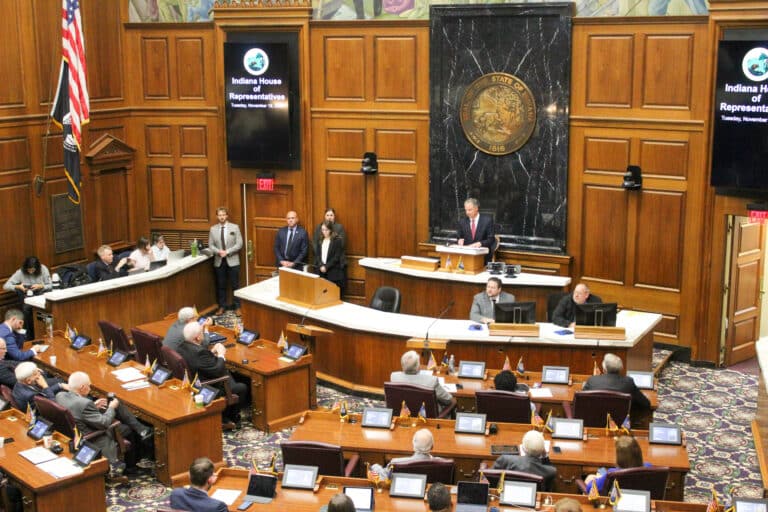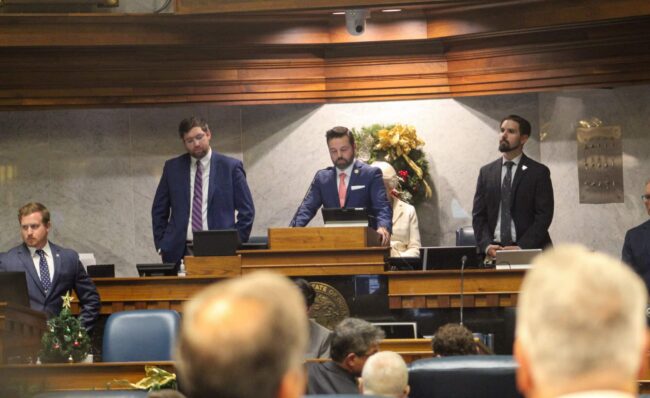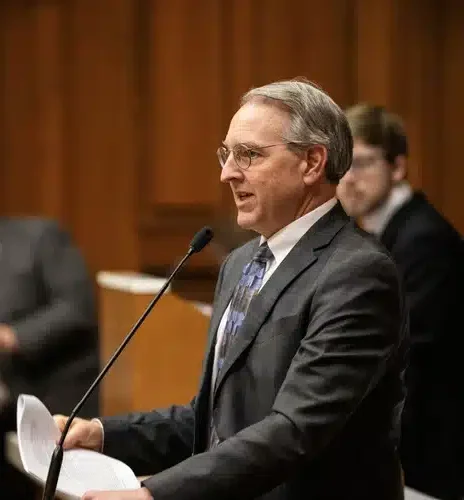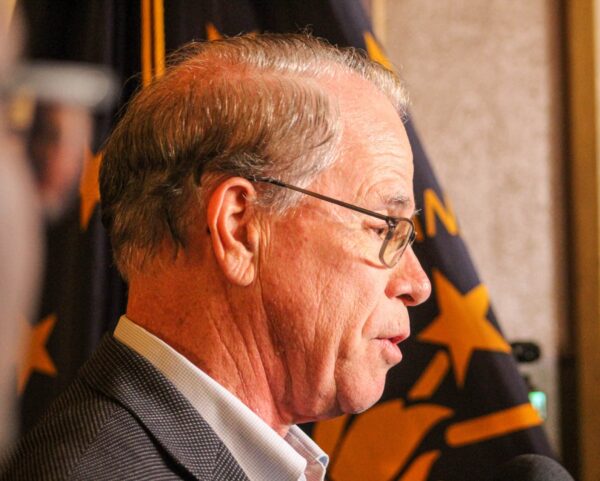
By Staff Report
The Indiana Citizen
TheStatehouseFile.com
November 18, 2025
The official start to the Indiana General Assembly’s 2026 session on Tuesday highlighted the divide between Republicans in the supermajority over the issue of mid-decade redistricting but provided little clarity on whether the legislature will redraw the state’s congressional map.
Within the span of roughly an hour Tuesday afternoon, the Indiana Senate voted to reconvene in early January, as the legislature typically does, while the Indiana House told its members to keep the first two weeks in December open so they can possibly return and vote on a new map. Also, while Indiana Speaker Todd Huston, R-Fishers, said he supported redistricting this year, Indiana Senate President Pro Tempore Rodric Bray, R-Martinsville, issued a statement saying he did not believe a mid-cycle reconfiguration would be beneficial.
As lawmakers were disbursing, Gov. Mike Braun issued a statement critical of Bray and indicating the fight over redistricting is not finished.
“Unfortunately, Sen. Rod Bray was forced to partner with DEMOCRATS to block an effort by the growing number of America First Senators who wanted to have a vote on passing fair maps,” Braun said in a statement. “Now I am left with no choice other than to explore all options at my disposal to compel the State Senate to show up and vote.”
GOP lawmakers have been discussing since August the possibility of reconfiguring the state’s nine congressional districts in advance of the 2026 mid-term elections, but no clear consensus has emerged. A majority of the Republican caucus in the House reportedly supports mid-decade redistricting while the GOP in the Senate has struggled to get enough votes to approve a new map.
Braun pushed the issue by calling a special session to start on Nov. 3. Legislative leadership turned the special session into an early session by delaying the start until the opening two weeks of December. However, last week, Bray announced his caucus still did not have the votes and the Senate would not be reconvening on Dec. 1.
Each new legislative session begins on a single day in November, dubbed Organization Day, and usually sees a few legislative housekeeping tasks and speeches from chamber leaders offering a glimpse of priorities for the coming session, which in 2026 will fall on Jan. 5.
But Org Day this year came after weekend social media posts from President Donald Trump, venting his anger about the Senate scuttling plans to redistrict on Bray and Sen. Greg Goode, R-Terre Haute, whose home was subsequently swatted Sunday evening.
The Senate met first on Tuesday afternoon and voted on Senate Concurrent Resolution 1, authored by Bray and Sen. Shelli Yoder, D-Bloomington, which would “allow the Senate and the House of Representatives … to adjourn and recess separately throughout the Second Regular Session for periods in excess of three consecutive days.”
Normally an unremarkable measure about reconvening in the new year, it held implications for redistricting.
Currently, the House is still holding on to the possibility of reconvening for an early session to consider redistricting, with Huston telling the representatives to keep their calendars open for the first two weeks of December. In the event of an early session, the resolution would effectively allow the Senate to meet separately from the House—or even not at all. The resolution passed the Senate on a 29-19 vote with 19 Republicans joining Democrats in supporting the measure.

Bray did not make a speech on the Senate floor as he has done during previous Organization Days. Instead he spoke to the media and released a statement after the Senate voted on the resolution, expressing his opposition to redistricting.
“A number of our caucus members, and myself included, don’t see this as a binary choice between the 7-2 ratio they have right now, and redistricting, and getting it to a 9-0,” Bray said, referencing the goal of the redistricting effort to put Republicans in all nine of Indiana’s congressional seats.
Also, Bray noted the increasing confines of the calendar, which requires candidates for the 2026 election to file by February and get ready for the primary in May.
“It’s November right now,” Bray said. “We don’t know what those districts are, (and) there is no preeminent candidate in either of those seats.”
Sen. Michael Young, R-Indianapolis, spoke against the resolution and chided the chamber for passing it, saying he has never seen any governor so disrespected by legislators. He said if the GOP loses control of the U.S. House, all the good things that have been accomplished since Trump took office will stop and the president will be sidelined by impeachment.
“I believe we have an obligation to protect what we think is important in our nation, and that’s governance by our party,” Young said. “Imagine waking up on Wednesday, the day after the election next November, and we find ourselves in the minority by one or two votes. I don’t know if I’ll cry that morning. I know I’m going to be sick to my stomach knowing that we have the opportunity to ensure that that doesn’t happen.”
He said if Republicans were worried about fairness, they would give the 40% of Hoosiers who voted for Kamala Harris for president more representation than they currently have.
“If you want to be fair, if you want to feel good, then give them two more seats,” Young said. “We’re not going to do that. And if we can’t be fair on that, why were we so concerned about being fair on redistricting? Because we’re not fair the other way. You can’t have it both ways.”
In his statement, Bray agreed with Young about maintaining a Republican-held U.S. House so Trump can retain the momentum on issues like fighting illegal immigration and crime.
“However, many in my caucus, myself included, do not feel that redrawing our congressional districts mid-cycle is the best way to achieve that goal,” Bray said. “We would rather support efforts to elect a Republican in the existing 1st Congressional District, which has been trending Republican for the last several years and would give President Trump another Republican in Congress.”
Across the rotunda, House Speaker Todd Huston, R-Fishers, summarized a strange news cycle as he addressed the lower chamber.
“I don’t know about you, but I’ve had an interesting fall,” Huston told the chamber. “My 2025 bingo card has been turned upside down with some new and quite interesting squares on it, but we shall move forward.”
Except for asking lawmakers to keep their December schedules open, he largely sidestepped redistricting and, instead, talked about economic issues—state GDP, housing affordability and the cost of living.
“For many Hoosiers, this is their greatest concern,” Huston said. “How do we make things more affordable for Hoosiers? We do it by growing our economy in ways that reduce cost burdens for them. …
“We may have a few speed bumps along the way,” he continued. “This year, I’m glad I get to work with a group of people sitting in this room. I know we all want the same thing, a strong, thriving Indiana.”
Following his address to the House, Huston said his caucus was prepared to vote on a new map and that “respectful” conversations are continuing with the Senate. He said he hopes Congress will take action to prohibit mid-decade redistricting but, at this time, Indiana is “not operating in a vacuum” and must respond to the states with Democratic controlled legislatures around the country that are reconfiguring their maps.
“Indiana cannot bury its head in the sand,” Huston said. “This is not a question of whether we join the fight. The fight is already here. The choice is whether we choose to unilaterally disengage, or do we use every tool at our disposal to help win and ensure Republicans have a fair chance in the upcoming federal elections.”
Asked what he would like to see happen, Huston replied, “My preferred outcome is we redistrict.”
Standing outside the House chamber, Rep. Matt Pierce, D-Bloomington, was doubtful the House would be called to reconvene in December. He described Huston’s call for representatives to keep next month open as a “fig leaf” to appease Trump and let the president know the Indiana House has not abandoned the effort to redistrict even if the Senate has.

Pierce said he was pleased to see members of the Senate stand on principle and come out against redistricting.
“That’s really awesome, and I thank them for that,” Pierce said. “I think that the fact that Rod Bray had the courage to essentially say, ‘The votes aren’t there, we’re not going to meet,’ I think that’s really a great thing for the state and for the country.”
Throughout the redistricting fight, Democrats have been uniformly opposed. The minority party has consistently said the legislature should be focused on addressing the economic issues that are squeezing Hoosier families’ budgets.
Pierce reiterated the Democratic rebuttal, saying redistricting was a distraction from the real problems.
“I and my Democratic colleagues will do everything we can to stop it, slow it down, have the public push back on it, but I really think they’ve concluded that the public just doesn’t want it,” Pierce said. “I think that a lot of Republicans don’t know it’s unfair as well as don’t support it, I think it’s only the most extreme Republicans who are kind of in that Donald Trump cult who want to win at all costs.”
Gregory Shufeldt, associate professor of political science at the University of Indianapolis, said what happened in the Indiana House was normally what happens—members took a voice vote to not meet until January because it is usually not contested.
However, the Senate took a roll call vote, which records each senator’s vote. A no vote can indicate the member does not want to meet in December for redistricting.

Shufeldt said this may be as close as the legislature will get to having a vote on the issue.
He added that Braun has called a special session but does not have authority to force the legislature to take a vote on the things that he wants them to consider. Even if the governor could legally compel the Senate to meet, Shufeldt said there is nothing that would prevent the Senate from immediately taking a vote to adjourn.
Lawmakers raise different concerns
Sen. Andrea Hunley, D-Indianapolis, said it’s time for the General Assembly to focus on kitchen-table issues instead of redrawing borders.
“We have affordability issues. Hoosiers are so worried about their utility bills, about their health-care bills, about child care, the price of groceries—everything,” said Hunley. “We need to be focused on how we’re supporting Hoosiers and how we are making sure they get real solutions right now.”
Rep. Robin Shackleford, D-Indianapolis, stressed the harm that could come to minority communities if redistricting goes through.
“When you’re talking about trying to do it now and breaking up Marion County, I think it’s going to be very harmful for the minority community and our representation at a federal level,” she said. “If you’re talking about taking District 7 and splitting that up, we only have one African American representative representing our interests in the federal government.”
Sen. Travis Holdman, R-Markle, said his constituents do not support redistricting and therefore neither does he.
“I do not believe redrawing our map will guarantee a 9-0 result,” he said in a press release. “Rather, to get Trump another Republican seat in Congress, we should support efforts to flip Indiana’s 1st Congressional District, which has long been trending Republican, and that’s where I’ll be focusing my efforts.”
Rep. Chris Jeter, R-Fishers, said he would keep his December calendar open as directed but was noncommittal about whether he would support a new map. He said he has been listening to his constituents and giving the matter careful thought.
“I’m willing to vote on any bill at any time whenever we’re called back,” Jeter said. “But there’s just so many different things at play, so many kinds of … moving parts, I just don’t know if (a vote) will happen or not, to be honest.”
This story has been corrected to show that 19 Republican Senators voted for the resolution introduced in the Senate during Organization Day.
Sydney Byerly, Kyra Howard, and Marilyn Odendahl of The Indiana Citizen and Chloe White of TheStatehouseFile.com partnered to produce this story.
TheStatehouseFile.com is a news site powered by Franklin College journalism students.
The Indiana Citizen is a nonpartisan, nonprofit platform dedicated to increasing the number of informed and engaged Hoosier citizens. We are operated by the Indiana Citizen Education Foundation, Inc., a 501(c)(3) public charity. For questions about the story, contact Marilyn Odendahl at marilyn.odendahl@indianacitizen.org.